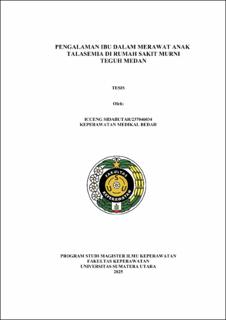| dc.description.abstract | Thalassemia is a genetic disorder characterized by a chronic and serious condition that requires lifelong blood transfusion. This situation demands comprehensive attention to ensure the child's health is maintained while minimizing the emotional and social burden on mothers and caregivers. This study aims to explore the experiences of mothers in caring for children with thalassemia at Murni Teguh Hospital. A qualitative descriptive phenomenological approach was employed using purposive sampling to recruit 15 mother participants whose children had been diagnosed with thalassemia. Data were collected through in-depth audio-recorded interviews conducted from March to April 2025. The data were analyzed using Colaizzi’s method to identify specific themes related to the mothers’ caregiving experiences. The study identified eight main themes: emotional and psychological burdens, economic challenges and access to care, child care strategies, social and environmental support, negative experiences, expectations of the healthcare system, maternal spirituality, and lack of understanding about thalassemia. The findings reveal that mothers of children with thalassemia face multiple challenges, including psychological and social pressure. Their caregiving role is further complicated by limited knowledge, financial constraints, and inadequate support from healthcare systems. Strengthening communication with healthcare professionals, enhancing family education, and implementing integrated healthcare policies are essential. The study concludes that caring for children with thalassemia requires a holistic approach and ongoing support from families, healthcare providers, and health systems. | en_US |


